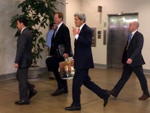 AFP: The White House intensified efforts to placate political opposition to an interim Iran nuclear deal, as one influential Republican suggested delaying a vote on new sanctions until July.
AFP: The White House intensified efforts to placate political opposition to an interim Iran nuclear deal, as one influential Republican suggested delaying a vote on new sanctions until July.
By Stephen Collinson and Michael Mathes

Washington (AFP) — The White House intensified efforts to placate political opposition to an interim Iran nuclear deal, as one influential Republican suggested delaying a vote on new sanctions until July.
The Obama administration released an implementation agreement on the pact, which goes into force next week, to defuse claims it struck a secret back channel deal with the Islamic Republic.
Top US nuclear negotiator Wendy Sherman meanwhile held a closed door briefing with skeptical senators, seeking to convince them to hold off on imposing new sanctions that the White House fears could prompt Iran to ditch diplomacy.
The summary of “technical understandings” between Iran and world powers sets the terms of a deal reached in Geneva last year, which will be implemented by the UN watchdog the International Economic Energy Agency (IAEA) officials.
It lists Iranian nuclear facilities to be inspected and a timetable for entry by IAEA officials and contains a payment schedule for nearly $7 billion in blocked Iranian foreign exchange holdings which will be released under terms of the deal.
The administration also made a more detailed document available to a restricted audience of lawmakers and aides in Congress, in line with the IAEA’s wish to keep some aspects of the pact confidential, White House spokesman Jay Carney said.
Former Pentagon chief Robert Gates warned Thursday new sanctions would be a mistake that would sabotage a possible diplomatic deal.
“I think that the president’s opposition to a bill that would impose additional sanctions now is absolutely right,” Gates said at an event highlighting his newly released memoir.
“To vote additional sanctions today would be I think a deal-killer,” said Gates, who served as defense secretary under President Barack Obama and his predecessor, George W. Bush.
Opponents of the interim nuclear deal between the P5+1 group of powers and Iran warn that it gave up too much in return for what they see as paltry concessions from the Islamic Republic.
Sherman apparently failed to convince the skeptics.
“Really I’m more disturbed now than ever after the briefing,” said Republican Senator Lindsey Graham.
“The endgame being contemplated is not even in the ballpark of what I would consider the endgame.”
Skeptics of the deal, including Israel and many US lawmakers, argue that Iran must not be allowed even a minimal capacity to enrich uranium in a final agreement.
Obama, backed by many in the analytical community, however argues that such a “perfect” deal is beyond reach. The president is seeking an agreement that ensures Iran can be stopped short of the point where it could quickly produce a nuclear weapon.
Supporters say further toughening sanctions on Tehran’s petroleum industry and other sectors would increase Obama’s leverage at the negotiating table, but the White House warns that sanctions could lock the United States on a slippery slope to war.
The pro-sanctions camp believe it has at least 59 votes in the Senate and a healthy majority in the House of Representatives and could be approaching the two-thirds majority needed to override the veto Obama has promised.
It remains unclear however whether Senate Majority leader Harry Reid, keen to avoid embarrassing fellow Democrat Obama, will bring the sanctions bill up for a vote.
Republican Senator Bob Corker meanwhile suggested a compromise position, noting that US officials agreed to impose no new sanctions for the six-month duration of the interim deal.
“Why don’t we schedule a vote for July 21,” he said. “If they haven’t reached an agreement that we believe is satisfactory, let’s implement on that day.”
The P5+1 group includes the five permanent members of the UN Security Council, the United States, Britain, France, Russia, and China, as well as Germany.
The interim deal, meant to buy time for detailed negotiations on thwarting what the West sees as Tehran?s drive for nuclear weapons, will go into force on January 20.
“With this implementation plan, we have made concrete progress,” the White House said in its summary of the document.
“We will now focus on the critical work of pursuing a comprehensive resolution that addresses our concerns over Iran?s nuclear program.”
The summary was released amid rising speculation that Secretary of State John Kerry could meet Iranian President Hassan Rouhani at the World Economic Forum in Davos next week.
State Department spokeswoman Jen Psaki said there were no meetings so far to announce but noted Kerry would be in the Swiss resort at the same time as “a number of Iranian officials.”
The summary confirmed that, under the deal, Iran would halt production of near 20 percent uranium and start to dilute the uranium stockpile it already has.
Iran has also committed not to enrich half of the installed centrifuges at its Natanz plant and three-quarters of installed centrifuges at the Fordow facility.
The Natanz and Fordow sites will now be subject to daily IAEA access as opposed to every few weeks. Its Arak reactor will be subject to monthly IAEA inspections.
Some sanctions relief will be available to Iran on the very first day of the accord.
Once IAEA verification has taken place, the P5+1 will start taking steps to ease the sanctions straitjacket on Iran more broadly.


